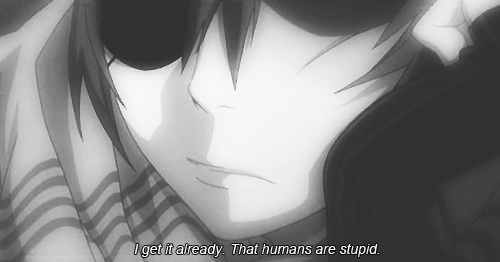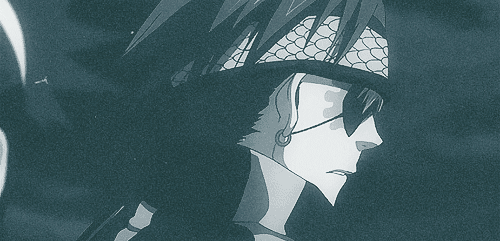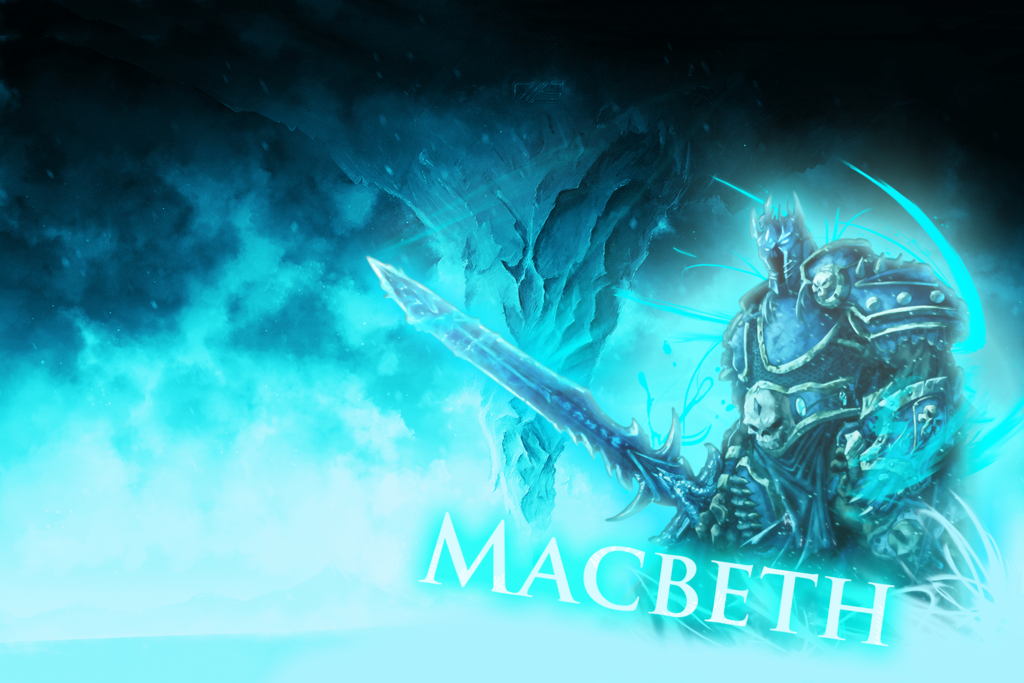Incoming massive spree of villain CSs. First starring Macbeth, a returning villain.
"I stood before him, frozen in fear. He walked by without grace, hesitation, and warmth; only the terrifying cold followed him."
Name
Macbeth
Age
Unknown
Gender
Male
Species/Race
Demon
Powers
Cold Flux - Macbeth affects temperature and blood pressure around him at a small radius. The more he sticks around a human being or an angel, the colder and more durable his body becomes. The cold around him can drop anyone's blood pressure (regardless of species, including demons). Holy spells are immediately dispelled when they enter the radius, giving Macbeth an increased regeneration effect.
Witch Hunt - If there are three or more people within a radius that scales to the size of a gladiatorial coliseum, Macbeth will have massively increased resistance physical attacks and immunity against magic spells. Note that his Cold Flux radius is deceivingly large. Demons cannot fulfill the requirements of this ability.
Ice Man - Macbeth's spells cannot be manipulated like regular ice. He also has excessive powerful resistance against offensive ice spells.
Painless - Macbeth is completely immune to spells that only induce pain, and has a naturally tough defense that mitigates a large input of the damage he gets.
Death Through Birth - When Macbeth dies, he will be automatically encased in a large chunk of ice. After seven days, Macbeth will reawaken and lose half of the powers his blade gained (Macbeth does not lose any of his sword's powers if he already collected more than 300 chunks of blood). Macbeth will be emotionally influenced by spells cast nearby or on his tomb of ice.
Sacrificial Rite - As the Sacrificial Rite grows stronger, Macbeth becomes stronger as well. An enemy struck by the Rite will empower it permanently by small amounts of energy surges, but hitting them again will not grant any more sacrifices to the Rite. Once Macbeth gains 300 stacks of blood packs, the Sacrificial Rite gains the ability to banish projectiles into nothingness by slicing through them, dispelling illusion effects, and forcefully unsummon summoned creatures. It will also boil and burn the wounds he inflicts unless he activates Sub-Zero Scepter.
Abilities
Freeze - Macbeth freezes himself with a duration that ranges from lengthy times to short moments. This ability envelops him in a large chunk of ice that cannot be destroyed during its limited lifetime. The ice is usually used to protect Macbeth from incoming wounds, all dealt from psychological, physical, or magical attacks. Once Macbeth unfreezes himself, the ability cannot be used for two minutes. The surprisingly short cooldown gives Macbeth more reliability in battle to make up for the lack of absolute power he has compared to several other greater demons.
Cold Lies - Macbeth selects a target as a point of origin to base his spell off of (the range of this ability is within a moderately large circle). He then summons an ice duplicate of himself, letting it appear at a location within the circumference he is basing his ability off of. The clone temporarily grants Macbeth vision and immediately proceeds to attack anything with a source of heat with an unskilled swordsmanship compared to its creator, distracting its target at the very most. There can be up to two clones in total, and cannot be summoned again until several minute pass by.
Sub-Zero Scepter - Macbeth channels the blood of the Sacrificial Rite into his body, empowering himself with an attack buff. When this spell is activated, all of Macbeth's sword attacks permafreezes his opponents' wounds. Each strike slowly grants him increased strength. The longer this enchantment is activated, the more of his own strength is decreased at a steadily rapid rate.
Tornado - Macbeth collects his willpower, letting his Sacrificial Rite form a blizzard around him. Macbeth can either keep the vigorous blizzard as a shield against attacks, or send slash at the air, sending the blizzard to a designated location. The blizzard damages anything around him, including demons.
Hollow Coffin - Macbeth forms an ice replica of the Sacrificial Rite. He may simply use this as a blade, or as a projectile. If used as a projectile, Macbeth empowers the ice replica before violently throwing it at anything he is aiming to target. The first thing the replica hits (when used as an empowered projectile) will temporarily disable all magic powers, slightly decreasing the target's physical defense, and will shatter on impact.
Breakdown - Macbeth smashes the ground with his blade, causing spikes of ice to shoot out of the ground in front of him for three seconds.
Searing Snow - Macbeth launches a channel of pale-blue fire from his free hand. If an opponent is caught in the fire, the area they are hit in will become frosted for six seconds. Within these seconds, if Macbeth attacks the frosted area, he will deal increasingly heightened damaged based on the extent of the frost.
Overdrives
Deep Freeze - Macbeth puts away his blade before gathering a large amount of ice magic in his hands. When he channels this ability, Macbeth will glow a very pretty blue.All offensive magic spells sent at Macbeth will be nullified and empower the overdrive. After Macbeth charges the ability enough (usually around five seconds), he will fire a large, distorted beam of ice. The ice will freeze all targets in the beam's way for ten seconds. Macbeth cannot move for eight seconds after the ability is cast. There is a cooldown of five hours for this ability. (Macbeth requires 100 stacks of blood in the Sacrificial Rite to use this ability)
Tomb of the Ice Man - Macbeth selects a target or a group of targets. He then leaps toward them, mustering up his physical and magic powers, before smashing the Sacrificial Rite's blade into the ground, instantly creating a large, enclosed, frozen arena in the shape of a half-sphere that lasts for several minutes. Macbeth's Cold Flux radius is expanded to the size of the arena, and he is able to cast all of his abilities without any consequences. (Macbeth requires no stacks of blood in the Sacrificial Rite)
Challenge - Macbeth plunges his sword into the ground, shattering the ground beneath him and replacing it with a solid, floating piece of ice. A crackle of cyan energy from the blade heads straight towards a target he wishes to challenge into a duel, and the range of the bolt is fairly long. Once a living target is hit by the bolt, Macbeth and the struck opponent are sent to a massive castle of ice in an unknown location. After a duration of one minute, they are sent back to where they initially were, regardless of whether one of them is dead or not. (The energy bolt will pass through nonliving objects such as swords, guns, and clothes)
(Macbeth must have gained at least 200 stacks of blood for his Sacrificial Rite to use this ability.)
Maelstrom- Macbeth slams his blade in front of him, letting it serve as a power generator. Macbeth then channels a spell for one minute, and can be interrupted if enough force is used. If he successfully pulls off the spell initiation, one thousand giant shards of white ice will fall from the skies, and all of these shards will deal high damage and freeze anyone caught by five of the shards. There is a cooldown of seven days for this ability.
Weaknesses
Thane of Glamis - While Macbeth is powerful against angels, he has less of a chance to win against powerful humans. Macbeth heavily relies on his Cold Flux to face humans and human-related species.
Blood - Macbeth is a formidable opponent, but he requires the blood of demons to be fully effective. Every once in a while, he picks out random demons and kills them for the Sacrificial Rite.
Moral - Macbeth, while being a loyal servant to the Sacrificial Rite and Lucifer, has a sense of moral he himself is not used to. If something shakes this moral, he usually hesitates in finishing his jobs.
Fear - Macbeth tends to use fear to strike efficiently. While this is a trait that gives him advantages over his enemies, he too is able to feel fear as well. He is afraid of certain things, though they are neither fire nor death. This fear is also supported by his out-of-place moral.
Personality
Macbeth's sword does some of the talking and cutting, while Macbeth carries the sword. While the two of them do synchronize well in terms of power and authority, the weapon tends to stay asleep for long periods of time. Macbeth learns through what he does and what others tell him, and he never draws his sword on others first.
He cannot bring himself to strike down royal figures (ie. kings and princesses) without his sword's permission.Macbeth's weapon is slowly losing control of itself, which is the reason why it wants to bask itself in the blood of demons, return back to its original form, and kill Macbeth before things go completely out of hand.
Macbeth rarely talks.
Background
By the time Lucifer had taken control over his full powers once more, a large tomb of ice was discovered in a frozen wasteland nearby Hell. It had been illuminating a strange light, and it reeked of magic, letting most of the demons who saw it shiver in fear. Why it was so near, yet so far from Hell was a mystery, but it was eventually decided among some of Lucifer's officers that some of their men should go out and retrieve the strange tomb of ice.
At first, the ten soldiers sent out to retrieve the tomb of ice came back with nothing, claiming that when they neared it, it vanished into nothingness. Confused and somewhat daunted by the tomb's apparent illusion, some of the officers decided to lead the second squad sent to retrieve the strange object. Nothing was to hide from Hell, after all, and it certainly would anger their leader if he found out that they were unable to do something so simple as searching for an object. But again, they found nothing, only staring off into the wasteland.
Eventually, Lucifer returned and, severely disappointed with the officers' incompetence, ordered them to find the object in two days. Just when all hope seemed to be lost after a day flew by, one of the officers, who decided to use an illusion-detecting item, found the tomb. The instant moment he laid a finger on it, the tomb revealed itself to everyone. Much to their horror, an armored man, who had a sword stabbed through his very skull, lied within the ice prison.
Once the news of its discovery had been revealed, Lucifer demanded to see this "Ice Man" for himself. When it was brought before him, he observed it thoroughly... before he suddenly began to melt the unmelting ice. His men watched in astonishment and confusion as their lord burned down the prison.
Eventually, only the Ice Man himself remained frozen, standing as if he were in eternal pain.
Not everything was meant to be frozen. And some things were better off frozen.
The sword, which stuck cleanly out of the ice, suddenly glowed, oozing out large pulses of dark energy. It yearned for the blood of demons, the blood of humans... and most interestingly, the deaths of angels. Lucifer, amused, yet surprised by this sword's malicious intentions, managed to calm it down.
The blade, with the voice of a battalion of fallen men and women, introduced itself as the Sacrificial Rite. Its original owner was apparently a demon who sought out after the destruction of heaven, and wanted to use the power of his own men with his own hands. Once it revealed its origins to Lucifer, it was only then that the king of Hell decided that he may have some use for this strange blade. After a lengthy discussion with a persistent weapon of death, Lucifer managed to get the blade on his side.
The instant moment the deal was made, the final remains of the ice encasing the Ice Man shattered. The armored warrior dropped on his knees, confused in where he was. The Rite simply told him, with a soothingly sinful voice, "Do not worry... I- no,
we are here to guide you."
The Sacrificial Rite told the revived warrior that it revived him for the purpose of having someone capable of using it. The armored Ice Man, though he had no clue as to who he was, and who he was exactly serving, decided to comply. He, after all, did feel that disobeying someone who just saved his life was a sign of arrogance.
Lucifer was impressed by the Sacrificial Rite's power. But rather than the stubborn weapon, he found more interest in the Ice Man himself. This warrior- this confused, yet battle-hardened warrior- seemed like he would serve well for his revenge.
Speaking words of genuine truth, and a longing for a vengeance he wished to enact as soon as possible, Lucifer, the king of all demons, told the warrior,
"You are
Macbeth. And I order you to follow my orders, and get me the revenge I've always wanted."
Macbeth telepathically requested the Sacrificial Rite to ask Lucifer a question. "Who must I kill, he says," said the blade as if it were giddy, longing to taste blood again. At this, Lucifer could not help but smile at this naïve man.
"Brightendale," the traitor of Heaven said, his deceivingly kind face remaining the same. "Lily and Melody Brightendale."
The Ice Man nodded. He now got the basic gist of his purpose: he was to serve this man, Lord Lucifer, as well as his savior, the Sacrificial Rite.
And he was to bring the snow of death upon the Brightendales, along with every single being that was related to them.















